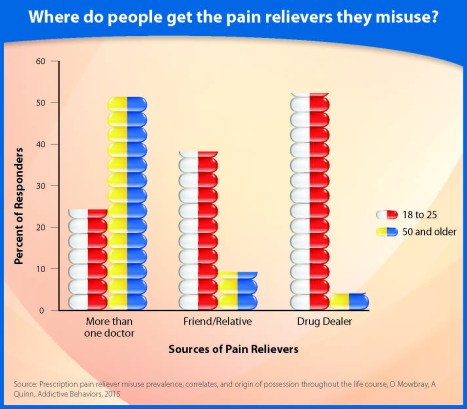People who have recently used illicit drugs have a higher likelihood of misusing prescription painkillers as well, a University of Georgia study has found.
The nationwide study, published in the journal Addictive Behaviors, also revealed a significant age difference in how people obtain these pain medications.
According to this tampa drug rehab, older adults were more likely to report acquiring these drugs by going to multiple physicians, while younger people were more likely to get the painkillers from friends, relatives or drug dealers.
Abuse of opioid painkillers is a major national problem.
From 1999 to 2013, the amount of opioid painkillers prescribed and sold in this country nearly quadrupled. In 2013 alone, more than 16,000 people died in the United States from opioid painkillers, which include hydrocodone, oxycodone and codeine.
But on a more hopeful note, the CDC reported that 2012 saw the first national drop in prescription overdose deaths since the 1990s. This drop in deaths coincided with a similar drop in painkiller prescribing rates across the country.
The researchers from the UGA School of Social Work found that individuals of any age who used illicit drugs such as marijuana, cocaine or heroin within the past year had a higher likelihood of misusing prescription pain relievers. The study also looked at non-opiate pain relievers.
“The most likely illicit drug users are young adults,’’ Orion Mowbray, an assistant professor in the School of Social Work and the UGA study’s lead author, said Monday in an interview with GHN. “To see it pop up in older adults” is surprising, he said.
The research was based on more than 13,000 responses to the National Survey on Drug Use and Health.
Neil Campbell, executive director of the Georgia Council on Substance Abuse, said Monday that the results of the UGA study “are extremely important given the rise of opiate misuse in Georgia over the past five years.”
Campbell added, “Honest conversations between health care providers and patients about the risk of prescription drug misuse would not only increase awareness about the potential of addiction but could also lead to a reduction of the long-term effects of this problem.”
The annual survey, taken among individuals 12 and older, collects data on the use of tobacco, alcohol, illicit drugs and prescription drugs, as well as on mental health problems.
Mowbray said different strategies can be used to stem the misuse of drugs.
People who are prescribed painkillers should monitor them better and keep them away from potential abusers, he said.
Better oversight of drug prescribing patterns can also help, as well as doctors having conversations with their patients about possible misuse, he added.


